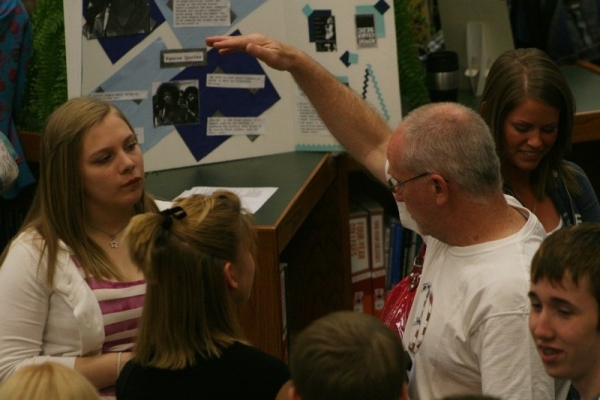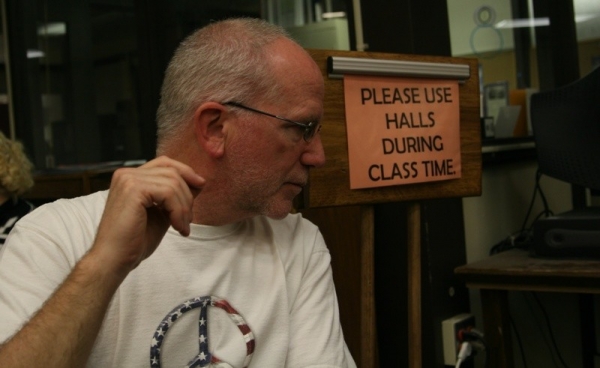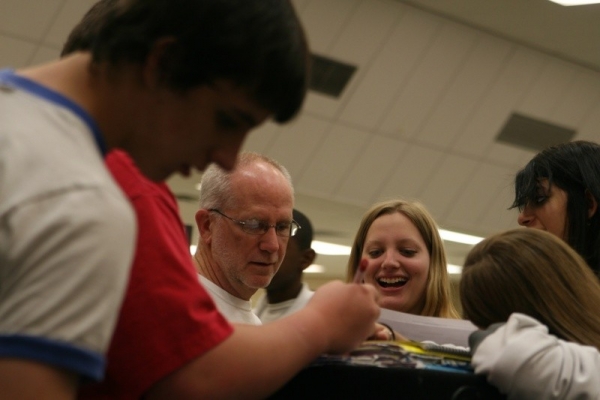Jack Buckingham Retires after 31 Years in SWCS
Over his 31 years as a teacher, Jack Buckingham never walked in the shoes of tradition. Sometimes labeled a closet hippie, Buckingham seems like a man running away from his suburban roots of Sandusky, Ohio; ironically, this extremely passionate anti-establishment personality made a great home in the very traditional walls of high schools for over three decades. He evolved into a soft-spoken man full of patience, kindness and a kid-like sense of humor that made him forever popular with his students—if not always colleagues and administrators—and trusted enough to be the teacher-voted union representative for the educators of Westland High School.
For many of his long time associates and friends, it almost doesn't seem real... but Jack Buckingham has finally decided to retire. When asked why, he answers almost too quickly that it's time. At 58, though, he has a lot of time ahead to remain vital and active—and you can sense that even he is full of conflict about his decision to end his professional career as an educator.
Noting how much he would miss the school environment and the kids, Buckingham said, "I had to put a lot of hard thought into this.”
Longtime friend and teaching collaborator Reggie Wagstaff is openly distressed. Encouraging anyone who will listen, Wagstaff implores students and staff to beg "Buck” to stay. Wagstaff came to WHS in the 1976-77 school year, one year before Buckingham.
Wagstaff, remembering their early years, said, "We were probably the young rebels.” Wagstaff's mortification at losing his colleague manifests when he asks students to call Buck "JW... He's Joe Wimp. He can't leave.” While the two have worked as close collaborators in a non-traditional dual-teacher curriculum, they have not always seen eye-to-eye—in part because the balding Caucasian Buckingham is much shorter than the taller, African-American Wagstaff (as Wagstaff points out)... But the admonition about "JW” is not an insult, though. It's a genuine fondness for Buck... and fear of loss.
Wagstaff said, "I think it's been a sweet mix... it's been a beautiful partnership.”
What Buckingham and Wagstaff (and others) have tried to do is challenge many of the core methods and assumptions embedded in schools, teachers, parents, students and administrators. Neither feels that they have found all the answers... but they have been passionate advocates of progressive education.
Their early collaboration stemmed from a movement at Westland in the early 1990s when Dick Caster was the principal. Buckingham, Caster, Bill Leibensperger, Jane Warne White and Jim Devine started a curriculum based on some of the ideas formulated by Theodore Sizer (the well known founder of the Coalition of Essential Schools). Since that time, Buckingham and Wagstaff have worked together in a dual-teacher classroom teaching history and English with a motto of "teacher as coach”.
Spend any time with Buckingham and you will learn that he is simultaneously passionate about education and hyper critical of public education.
As Buckingham notes, "The way we break things up in high school is stupid.” His goal is to show kids that each topic is tied to other topics—to find a way to get the teachers to collaborate more between subject areas and departments. In the real world, you don't just do math for forty minutes, then turn off the math switch to do English for forty minutes—then stop using English to spend forty minutes to do history. In real life, all topics integrate.
The movement embodied in the Coalition of Essential schools did not come without controversy. Some teachers were critical of it—some probably still are. Over time the curriculum stopped using reference to the Coalition... keeping only the intent and philosophy rather than a label. Buckingham notes that the curriculum he has been pursuing isn't necessarily the holy grail—he has learned "that there isn't one right way to teach a classroom.” What's more, a single method shouldn't calcify.
"I reinvent things every couple of years,” said Buckingham. The feeling is very democratic (small "D” as Buck is prone to say even though anyone who knows him knows that his allegiance falls on the left side of the political spectrum).
The life lessons learned over thirty plus years have given Buckingham a lot of experience and insight into education. Scott Johnson, another close colleague of Buckingham (who also helped bring Buckingham to Westland), said that, in the big scheme, we can all be replaced. Johnson then noted, "I think there's no replacement for experience... [and] after thirty-one years there's a type of closeness that can't be replaced.”
In the middle of saying, "I don't know of anyone who doesn't like him,” a student interrupted Johnson. "Do you know where Buck is?” It couldn't have been a more timely validation of a statement.
Students who know him always seek Buck for advice or a friendly ear. Patience and acceptance are embedded in his personality—not to mention a quick-witted and often devious sense of humor. Something in his personality makes him connect with teenagers; when they fill with rage or distress, his nurturing side comes forward. One teacher said she had learned much from Buckingham—commenting that she has always been impressed by how often Buck takes students aside to spend one-on-one time to discuss the many chaotic issues that pop up in teenagers' lives.
Another student, 18-year old Aarika Harris, is about to graduate. She says, "Buck pretty much changed my way of thinking.” Admitting she used to be shy, she credits Buckingham for helping her come out of her shell. He helped teach her to "just not sit back and let bad things happen.”
All these wonderful things being said about him... and still it hasn't been just one smooth ride for Jack Buckingham. A little bit of acid lines his lips on a few topics. In Buckingham's perspective, much of the problems in schools is not rooted in the kids that come to school—it's often administrators and parents.
Buckingham feels that, in his experience, many of the conflicts in schools come from administrators. "Some of them are so worried about appearances that they don't care how it gets that way.” Noting that many administrators are a "mixed bag of guys who couldn't teach”, it's ironic that they are the ones telling experienced teachers how to do their jobs.
"Most of the problems we've had are with the adults in the building.” However, Buckingham said, Westland's current administrative staff seems to be doing a good job. He said that the current administration under Kathryn Buckerfield seems both accessible and honest—adjectives he rarely used on most past administrations.
The other set of adults Buckingham blames for problems in school are parents. In the past, said Buckingham, parents would stand behind teachers. Modern schools are undermined by too many parents who do not side with the teachers. "It used to be that when kids got in trouble at school—the parents would punish the kids double the punishment at school.” Lacking that element... it seems that way too many students lack respect for teachers—a situation that can make a teacher's job as difficult as making hyenas and lions peaceful neighbors.
Buckingham knows he can't change the world. Modern dilemmas including school funding (South-Western City Schools just lost another levy) and race conflicts (a growing population of Somalian teenagers are clashing with other races in local schools) complicate the designs of educational fabrication. But he loves kids and being a teacher. He has seen his mission as trying to open up the minds of young men and women; to challenge them to find their own voices; to question their assumptions; to evaluate their lives and space. To create a habit of thinking and asking questions in students has been his underlying passion, despite all the challenges.
Assistant Principal Bill Hunton commented that he has known Buckingham for less than a year, but has already been impressed with how Buckingham gets kids to think on their feet rather "than just spoon-feeding them information”.
So why, Buck, are you leaving? Well it appears that the man who likes to reinvent his classroom every couple of years is taking a step into the realm of uncertainty to reinvent his own life. The man who has wore so many shoes (teacher, parent, husband, friend) is preparing to don a new pair of Chucks to pursue new things. He mentions traveling and photography. Following the Cleveland sports (the Browns, Cavs and Indians) must enter the agenda somewhere. Whatever he choses to do, though... I am sure education will forever surround his thoughts. If anything, you can make a good bet that he will be learning new things. As Scott Johnson said, "It's not an end. It's a beginning.”
An old friend and collaborator of Buckingham's, Bill Leibensperger (now Vice President of the Ohio Education Association) said, "I love him with all my heart. He's a natural born teacher.” Leibensperger stole my quote... for I was a student of Buck's and feel the same way.
Jack Buckingham played an important role in my personal education. He gave me the opportunity to be the school's newspaper editor. More importantly, though, he always took time to talk to me—and I was not an easy student to have. As a teenager I was very aggressive to the structure of school, forever carrying a chip on my shoulder. And although I am sure that Buck didn't agree with all of my angry tirades against education, he always encouraged me to find solutions and think.
I am sad that Jack Buckingham will not be at Westland High School to guide more of my children. At the same time, I am happy that I had the chance to be one his many students. When my children throw around tormented teenage thoughts that challenge the sanity of my home, I often find myself remembering how hard-headed I once was; that caring about others is important even in disagreements—maybe it's most important during disagreements. That habit comes, in part, from my experience with Buck.
Short List of Tips from Jack Buckingham
To Young Teachers:
- "Find out where [students] are. Take them from where they are to where you want them to be.”
- Be flexible
To Students:
- "Don't wait for someone else to solve the problem.”
- "Don't always rely on the first thing you click on the Internet for information.”
To Communities
- Reduce funding dependence on property taxes
- "No high school should be more than 450 people.”
- Increase student accountability by making them prove their proficiency in more authentic manners than current standardized testing
- Don't start High School before 9 a.m. since teenage brains aren't fully active before then
- My Schooling
Essays and personal accounts about my education.
- My Experience at Westland High School
- Return to Norton Middle School
- Promoting Interest in the Classroom
- Jack Buckingham Retires after 31 Years in SWCS
- Related Topics








